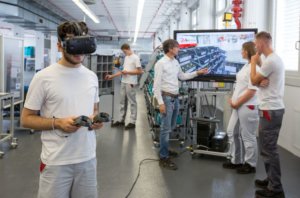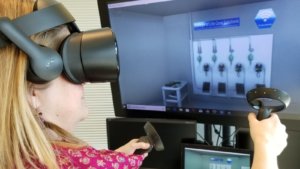Welcome to our recurring post, 3D Interactive Tech Talk, highlighting how interactive technology is being used right now and where it’s headed.
 Audi, the German luxury car company, continues to prove why they race circles around their competitors, with the development of their Virtual Reality Software Development Kit (VRSDK). This Kit allows Audi Trainers with IT knowledge, but little programming experience, to create courses and design content for new employees. “Project manager Mirko Göres from Audi Brand Logistics explained, “With the help of easy-to-use menu navigation, the trainer will be able to select the desired work steps and combine them.” It is no longer necessary to work directly in the program code.”
Audi, the German luxury car company, continues to prove why they race circles around their competitors, with the development of their Virtual Reality Software Development Kit (VRSDK). This Kit allows Audi Trainers with IT knowledge, but little programming experience, to create courses and design content for new employees. “Project manager Mirko Göres from Audi Brand Logistics explained, “With the help of easy-to-use menu navigation, the trainer will be able to select the desired work steps and combine them.” It is no longer necessary to work directly in the program code.”
At Audi’s Ingolstadt Training Center, new hires are using the VRSDK to learn multiple work stations and practice orders in the “pick-by-light” process, with positive results and reviews. Employees can earn and lose points as they move through the training – “with each level, the degree of difficulty increases. At the beginning, all work steps are moderated, but gradually the program gives fewer hints. In the final run, the employee must complete all tasks without any help. This increases motivation and boosts the trainees’ ambition.”
Since its inception, Audi has created 20 different training courses, in multiple languages, using the SDK, with plans to merge the program into Volkswagen’s Group-wide VR database by year’s end.
 GE, one of the leading suppliers of medical imaging tools and services, is using VR to train new and current Healthcare Technology Management (HTM) professionals who work on their MR and CT equipment. Not only does this customizable training program save the company money in travel and education expenses for employees, as technicians can now train at their center, but, “less obvious, but equally important, is the boost to employee engagement and morale. We no longer must ask engineers to travel over the weekend and take time away from their families. We have seen a quality of life improvement, too.”
GE, one of the leading suppliers of medical imaging tools and services, is using VR to train new and current Healthcare Technology Management (HTM) professionals who work on their MR and CT equipment. Not only does this customizable training program save the company money in travel and education expenses for employees, as technicians can now train at their center, but, “less obvious, but equally important, is the boost to employee engagement and morale. We no longer must ask engineers to travel over the weekend and take time away from their families. We have seen a quality of life improvement, too.”
As 25% of GE’s HTM professionals prepare to retire within the next 10 years, VR training allows for faster instruction and coaching, in a “mistake-driven learning” environment. “’Training the next generation of HTM professionals is a very hot priority right now, and virtual reality is going to be a big enabler,’ said Art Larson, GM, Global Services Training & Documentation, GE Healthcare.”
Do you have a question regarding this technology? Hit us up here now to discuss how this could apply to your needs.
And check out our virtual training solutions to see 6 real world case studies on how businesses are training their operations, maintenance, and field service teams.


